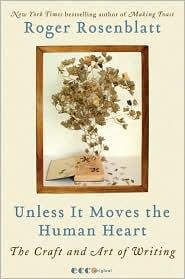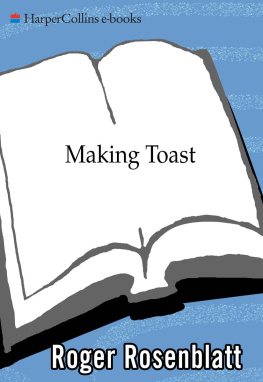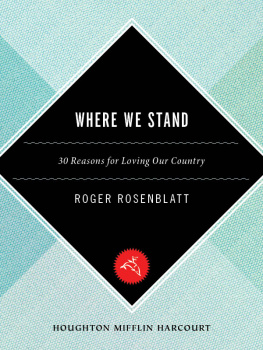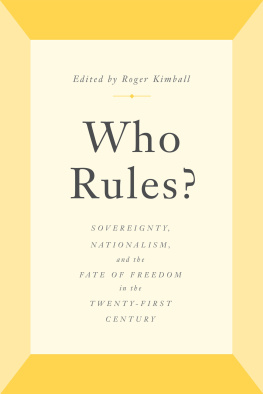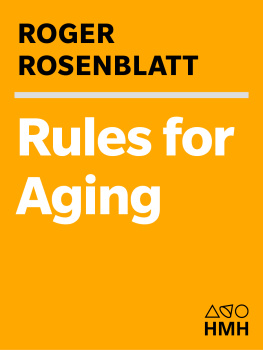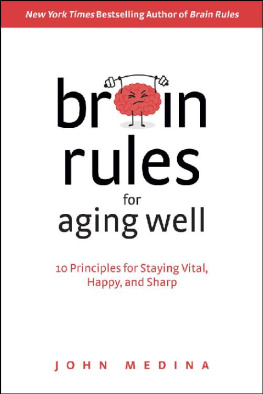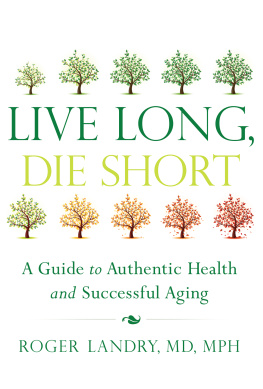
Table of Contents
Copyright 2000 by Roger Rosenblatt
All rights reserved. No part of this publication may be reproduced or transmitted in any form or by any means, electronic or mechanical, including photocopy, recording, or any information storage and retrieval system, without permission in writing from the publisher.
For information about permission to reproduce selections from this book, write to Permissions, Houghton Mifflin Harcourt Publishing Company, 215 Park Avenue South, New York, New York 10003.
www.hmhco.com
The Library of Congress has cataloged the print editon as follows:
Rosenblatt, Roger.
Rules for aging: resist normal impulses, live longer, attain perfection/Roger Rosenblatt,
p. cm.
ISBN 0-15-100659-8
1. AgingHumor. 2. Conduct of lifeHumor. 3. Aging. 4. Conduct of life. I. Title
PN6231.A43 R67 2000
818'.5402dc21 00-033539
eISBN 978-0-547-54444-1
v2.1013
For Ginny
(see .)
Introduction
This little guide is intended for people who wish to age successfully, or at all. I very much hope that older readers may profit from it as much as younger ones, but the fact that one has achieved at least middle age suggests that one has already heeded most of the rules provided here. One may think of this work as a how-to book, akin to the many health guides published these days, whose purpose is to prolong our lives and make them richer. That is the aim of my book, too. Growing older is as much an art as it is a science, and it requires fewer things to do than not to do.
What follows, then, is mainly a list of donts and nots, not unlike the Ten Commandments, but without the moral base. The rules herein are intended to be purely practical. When I urge you to refrain from a certain thought or course of action, I do not mean to suggest that you are in any way wrong if you do the opposite. I mean only to say that you will suffer.
The rules are numbered consecutively for your convenience. Once you commit them all to memory, you may find it easier to simply refer to the appropriate number. Otherwise nothing is required of the reader but a willingness to change ones entire way of looking at things. Resist every normal impulse, and a perfect life is yours forever. Good luck.
Roger Rosenblatt
It doesnt matter
Whatever you think mattersdoesnt. Follow this rule, and it will add decades to your life. It does not matter if you are late, or early; if you are here, or if you are there; if you said it, or did not say it; if you were clever, or if you were stupid; if you are having a bad hair day, or a no hair day; if your boss looks at you cockeyed; if your girlfriend or boyfriend looks at you cockeyed; if you are cockeyed; if you dont get that promotion, or prize, or house, or if you do. It doesnt matter.
Nobody is thinking about you
Yes, I know, you are certain that your friends are becoming your enemies; that your grocer, garbage-man, clergyman, sister-in-law, and your dog are all of the opinion that you have put on weight, that you have lost your touch, that you have lost your mind; furthermore, you are convinced that everyone spends two-thirds of every day commenting on your disintegration, denigrating your work, plotting your assassination. I promise you: Nobody is thinking about you. They are thinking about themselvesjust like you.
Let bad enough alone
This rule requires some amplification because it involves one of the more complicated, charming, and lethal human facultiesoptimismspecifically the optimism that embraces the belief that persistent clarification after one has committed a social blunder will make everything all right.
On the afternoon of September 24, 1980, William Agee, chairman of the Bendix Corporation, experienced a fit of candor and decided to make a speech before 600 employees. His intention was to put at rest, once and for all, the rumors that his admittedly close friendship with attractive, blond 29-year-old Mary Cunningham had a connection with her professional rise from executive assistant to vice president for strategic planning in the stunningly short space of 15 months. Having thus cleared the air, Agee settled back to observe the story of his affair with Cunningham dominate the headlines for many weeksin a news era that could otherwise have been interested in a war in the Middle East and a plunging stock market.
After Agees clarifying exercise, his company issued a statement that a major disclosure would be forthcoming; but upon further reflection, Agee decided that we just didnt have any more to say. Too bad that came a bit late. Soon he and Cunningham left Bendix in disgrace to become enshrined in American business folklorenot because they had sinned or because Cunningham had been improperly promoted, but simply because of Agees boyishly optimistic gesture.
A realist will always let bad enough alone, but a romantic cannot stop himself from saying just one more thing that will clear up the mess. Poor Agee had no idea that by making a clean breast of things, which is supposed to be good for the soul, as well as part of the American way, he would be snatching disaster from the jaws of suspicion.
He should have looked more closely into history before he leaped. His suicidal forthrightness placed him squarely in a most distinguished company of reckless clarifiers, all of whom, at one crucial, wretched moment of their lives, were possessed by the demonic inspiration that if they could only explain themselves fully in the throes of scandallet it all hang out, lay their cards on the table, spare no detail, be up-front, come clean, and so forththe grateful, enlightened public would stand as one and shout, I see! Thank you! and all would be forgiven.
This is how George F. Baer achieved American duncehood during the Pennsylvania coal strike of 1902 when a resident of Wilkes-Barre wrote to Baer, the chief spokesman for the mine owners, to express anxiety over the ravages of the strike. Baer decided to explain himself. In a letter that was later widely circulated, especially among the United Mine Workers, he reassured his correspondent that some people were placed on earth to manage and others to serve, and that this was the divine order of things. Said Baer: The rights and interests of the laboring man will be protected and cared for, not by the labor agitators, but by the Christian men to whom God in His infinite wisdom has given control of the property interests of the country. So that was that.
Then there is William Jennings Bryan who, having seen his fundamentalist creed vindicated during the Scopes trial of 1925, still insisted on taking the stand to make his antievolution position crystal clear. He did, thus exposing himself to national (and historical) ridicule. And there is Oveta Gulp Hobby who, as Secretary of Health, Education and Welfare in 1955, explained the shortage of the new Salk polio vaccine with these words: No one could have foreseen its great acclaim. And there is always Richard Nixon, the apostle of perfect clarity, who at times seemed hell-bent on clarifying himself out of office.
As the wise have always told us, the lesson in all such instances is: remember the abiding value of keeping ones mouth shut. Not for nothing did La Rochefoucauld call silence the best tactic for him who distrusts himself. It is not simply that silence is generally prudent; it also encourages the presumption of virtue, appearingespecially in times of adversityas a sign of both discretion and suffering. But the best reasons for keeping ones counsel, especially during a scandal, have to do with common sense:
Next page

